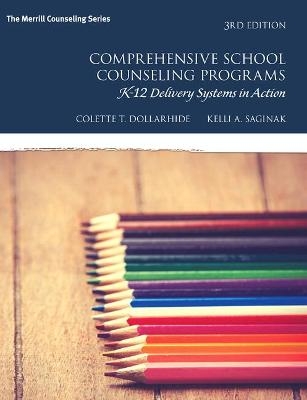
Comprehensive School Counseling Programs
Pearson (Verlag)
978-0-13-390521-2 (ISBN)
- Titel z.Zt. nicht lieferbar
- Versandkostenfrei innerhalb Deutschlands
- Auch auf Rechnung
- Verfügbarkeit in der Filiale vor Ort prüfen
- Artikel merken
Accessible and inclusive, this comprehensive guide to K-12 school counseling explores delivery systems and the practical tools professional school counselors need to design, implement, manage, and evaluate comprehensive, developmentally appropriate school counseling programs for all students. Starting from the perspective of “what is a school?” it presents and updates all of the elements of a comprehensive school counseling program, including the holistic, balanced, preventive, and reflective elements, and those integrated with the academic agenda. Aligned with the most current ASCA National Model, ASCA Competencies, and new 2016 CACREP Standards, Comprehensive School Counseling Programs underlines the professional context of school counseling in the real world of public education. The updated, revised chapters of this new edition written by contemporary experts in the field of school counseling.
Colette T. Dollarhide, Associate Professor of Counselor Education at The Ohio State University, earned her master’s and doctorate degrees in counseling and educational psychology from the University of Nevada, Reno. She earned her bachelor’s degree in political science from California State University at Fullerton. She has been a counselor since 1988 and a counselor educator since 1995. For the past 15 years, Dr. Dollarhide’s teaching and research focus has specialized in school counseling at the master’s and doctoral levels, but she has also taught career counseling, college student development, theories and techniques of counseling, foundations of school counseling, special issues in school counseling (at elementary, middle, and secondary school levels), counseling through play, ethics, consultation, supervision, group counseling, pedagogy in counselor education, and practice and internships. Her research agenda includes school counseling leadership, professional identity, social justice, and counseling pedagogy, and Dr. Dollarhide has published and presented papers at international, national and state conferences. Her professional service includes President of C-AHEAD (now AHC), eight years as a reviewer for Counselor Education and Supervision (CES), coeditor for a first-ever CES special section on school counselor supervision, four years as a reviewer for Journal of Counseling and Development (JCD), and Editor of the Journal of Humanistic Counseling. Dr. Kelli Saginak, Ed.D., NCC, lives with her family in Oshkosh, Wisconsin. Her career has served the field of counseling and education, as a teacher, counselor, prevention specialist, and consultant. Kelli is an advocate for young people and strives to educate, train, and inspire professional counselors to serve today’s youth, as leaders, advocates, and agents of systemic change. Her passion for youth inspires her writing, scholarship, and teaching in the areas of school counseling, counseling process, counseling with children and adolescents, lifespan development, and addictions counseling. Kelli presents on a variety of counseling-related topics and has co-authored several publications, such as: School Counseling in the Secondary School: A Comprehensive Process and Program and most recently, the 3rd edition of Comprehensive School Counseling Programs: K-12 Delivery Systems in Action.
Brief Table of Contents
Chapter 1. The Profession of School Counseling - 1
Chapter 2. Schools as Social Institutions - 20
Chapter 3. Qualities of Comprehensive School Counseling Programs - 35
Chapter 4. The ASCA National Model - 64
Chapter 5. The Themes of Your Comprehensive School Counseling Program: Leadership, Advocacy, Collaboration, & Systemic Change - 87
Chapter 6. Foundation, Management, and Accountability Systems of Your CSCP Foundation System Management System - 110
Chapter 7. Delivery of Your Comprehensive School Counseling Program - 123
Chapter 8. Delivery System: Counseling Activities in the DAP Model - 138
Chapter 9. Delivery System: Educating Activities in the Domain Activities/Partners (DAP) Model - 156
Chapter 10. Delivery System: Consultation in the Domains/Activities/Partners (DAP) Model - 178
Chapter 11. A Comprehensive School Counseling Program (CSCP) in Action: A Ramp Middle School - 194
Chapter 12. Ethical, Personal, and Professional Issues - 207
Appendix A Program Goals for Adult Partners in the Domains/Activities/Partners (DAP) Model - 223
Appendix B Websites To Consult - 235
References - 239
Index - 278
Detailed Table of Contents
Chapter 1 The Profession of School Counseling 1
Overview of This Text 2
Professional competencies of school counselors 2
External Tests of Professional Competencies 3
Personal Qualities of a school counselor 5
Creativity and Imagination 5
Flexibility 5
Courage and Belief 5
Passion 6
Commitment to Diversity and Social Justice 6
Philosophies of Counseling 7
Philosophies of Education 8
Philosophies of School Counseling 10
Guidance/Careers Emphasis 11
Mental Health Emphasis 12
Developmental Guidance 12
Comprehensive School Counseling Programs (CSCP) 13
ASCA Role Statement and National Standards 13
ASCA School Counselor Competencies 14
ASCA National Model 15
Introduction to Models for CSCPs 15
Developmental Guidance and Counseling 15
The Essential Services Model 16
The Results-Based Student Support Program Model 16
The Strategic Comprehensive Model 16
Strengths-Based School Counseling 17
A Social Justice Approach to Comprehensive School Counseling 17
The Domains/Activities/Partners Model 17
Conclusion 19
Chapter 2 Schools as Social Institutions 20
What Makes Effective Schools? 21
Effective Schools 21
How Do We Know That a School Is Effective? 23
Effective Relationships within Educational Communities 28
School Counselor as Coordinator 29
Definition of Coordination 29
Coordination (and Leadership) in School Counseling 30
Closing the Gap and Monitoring Achievement, Equity, and Access 30
Academic Coordination 30
Services Coordination 32
Conclusion 33
Chapter 3 Qualities of Comprehensive School Counseling Programs 35
Comprehensive School Counseling Programs 36
CSCPs are Holistic 37
Academic Development 37
Career Development 40
Social and Emotional Development 45
CSCPs are Systemic 48
Social Systems: Family, Peers, School, Community, and Culture 49
Systemic Change and Multisystemic Interventions 53
CSCPs are Balanced 55
Balanced Counselor Activities 56
CSCPs are Preventive 56
Prevention, Intervention, and Treatment 58
CSCPs are Integrated 59
CSCPs are Reflective 60
Reflection on the Quality of Program and Counselor Performance 61
Chapter 4 The ASCA National Model 64
The Professionalization of School Counseling 65
The ASCA National Model 66
Overview of the Model 66
The Themes: Leadership, Advocacy, Collaboration, and Systemic Change 67
Leadership 68
Advocacy 69
Collaboration 69
Systemic Change 70
The Elements of the ASCA National Model: Foundation, Management, Delivery, and Accountability 71
Foundation 71
Management System 75
Delivery System 79
Accountability System 83
The Flow 85
Chapter 5. The Themes of Your Comprehensive School Counseling Program: Leadership, Advocacy, Collaboration, & Systemic Change - 87
Leadership, Advocacy, and Collaboration in a CSCP 87
Leadership: School Counselor as Leader 88
Formal and Informal Power Structures 90
Definition of Traditional Leadership, Transformative Leadership, and Transformational Leadership 91
Participatory Leadership and Distributed Leadership 93
Myths about Leadership 94
Personal Qualities of Effective Leaders 94
Leadership Roles and Skills 95
A Process Model of Leadership 96
Advocacy: School Counselor as Advocate 96
Definition of Advocacy 96
Advocacy for Systemic Issues: Social Justice 97
Collaboration: School Counselors as Collaborators 98
Critical Resources to Support School and Community Partnerships: The School Counselor’s Role* 98
Systemic Change: School Counselor as Systemic Change Agent 100
Transformative Leadership, Accountability Leadership, and Systemic Change 101
Leadership, Advocacy, and Collaboration: Examples and Issues 102
Leadership, Advocacy, and Collaboration with Students 102
Leadership, Advocacy, and Collaboration with Parents 103
Leadership, Advocacy, and Collaboration with School Colleagues 103
Leadership, Advocacy, and Collaboration with Community Colleagues 108
Chapter 6 Foundation, Management, and Accountability Systems of Your CSCP Foundation System Management System 110
Foundation system 111
What Do Students Need? 112
Student Competencies 113
Professional Competencies 113
Management system 114
The Advisory Board 115
Tools 116
Accountability System 116
What Are Data? 117
Program Evaluation 118
Disseminating Results 121
Chapter 7 Delivery of Your Comprehensive School Counseling Program 123
Delivery Models 124
Various Models of Delivery systems 125
The Developmental Guidance and Counseling Model 126
Strengths-Based School Counseling 129
A Social Justice Approach to Comprehensive School Counseling 130
The ASCA National Model 131
The Domains/Activities/Partners Model 132
Chapter 8 Delivery System: Counseling Activities in the DAP Model 138
Counseling Activities 139
The School Counselor as Counselor 140
Misconceptions of Counseling 140
Prevention, Intervention, and Treatment: When to Counsel and When to Refer 141
Crisis Intervention and Suicide Prevention 142
Multiculturally Appropriate Counseling 144
Developmentally Appropriate Counseling 145
Legal and Ethical Considerations 146
Assessment within the Counseling Process 147
Individual Planning 148
Individual Counseling 148
Using Creative Strategies and Multiple Intelligences in Counseling 149
Group Counseling 150
Structured (Psychoeducational) Versus Process Groups 150
Implications and Considerations of Group Counseling 151
Peer Facilitators 152
Counseling with Adult Partners 153
Systems Thinking: Families, Schools, and Communities 153
Selection of Counseling as an Intervention 154
Chapter 9 Delivery System: Educating Activities in the Domain Activities/Partners (DAP) Model 156
School Counselor as Educator 157
Educating Students for Healthy Development 158
ASCA Mindsets and Behaviors for Student Success and the School Counseling Core Curriculum 159
Assessing for Barriers to Learning 159
Educating Using Multicultural Insights 160
Steps for Designing Learning Experiences 160
Step 1: Intent 160
Step 2: Instructional Purpose 161
Step 3: Mindset, Behavior, and/or Competencies Addressed 161
Step 4: Learning Objectives 162
Step 5: Instructional Methods and Multiple Intelligences 162
Step 6: Materials Needed 162
Step 7: Procedure 163
Step 8: Evaluation: Process Data, Perception Data, Outcomes Data 163
Step 9: Follow-Up 163
Integrating the Curriculum Using Multiple Intelligences 164
Delivering the Curriculum 169
Teaching Strategies and Lesson Planning 169
Learning Communities and Classroom Management 171
Positive Behavior Support (PBS) 172
Educating Adult Stakeholders 173
Educating Adult Partners: Considerations 174
Chapter 10 Delivery System: Consultation in the Domains/Activities/Partners (DAP) Model 178
Consultation
Definition of Consultation 180
Generic Process Model of Consultation 181
Prescription Mode 182
Provision Mode 182
Initiation Mode 183
Collaboration Mode 183
Mediation Mode 183
Multicultural Considerations
Increasing Multicultural Competency 184
Consideration of Social, Cultural, and Educational Context 184
Mindfulness of School-Specific Social Justice Issues 184
Promotion of Fair Collaboration Among Educational Stakeholders 184
Consultation with Student Partners 185
Consultation with Adult Partners 186
Client-Centered Case Consultation 187
Program-Centered Administrative Consultation 187
Consultee-Centered Administrative Consultation 188
Consultee-Centered Case Consultation 188
Consulting With Parents and Caregivers 190
Consulting With School Colleagues 190
Consulting With Community Colleagues 191
General Issues: Overcoming Common Challenges in Consultation 191
Chapter 11 A Comprehensive School Counseling Program (CSCP) in Action: A Ramp Middle School 194
Recognized ASCA Model Program (RAMP) 194
The RAMP Application Process 195
RAMP Development and Outcomes 195
A RAMP-Designated Middle School Program 197
Illustrating the RAMP Process: Components of the BMS Program 198
Foundation 198
Management and Accountability 198
Delivery 199
Becoming a RAMP Program Over Time 204
Chapter 12 Ethical, Personal, and Professional Issues 207
School Counseling and Ethics 208
The School Counseling Codes of Ethics 209
Legal Issues 210
Ethical Decision-Making Process 211
Case Scenario: 211
Common Legal/Ethical Problem 212
Confidentiality 212
Rights of Parents and Informed Consent 213
Defining the “Client”: Conflict of Interest Between Student and School 214
Counselor Competence 215
Clinical Notes and Records 216
Online Counseling and the Use of Technology 216
Diversity and Values 217
Equity and Access 218
Professional Liability, Insurance, and Certification 219
Responding to Legal Action 220
Resources and Recommendations for School Counselors 220
Personal Mental Health: Seeking Balance 221
Finding Your Center 222
Doing Your Best, Then Letting Go 222
Stress Management Strategies 223
Professional Health: Being Realistic 226
Professional Identity 226
Portfolios 226
Supervision 227
Colleague Consultation and Networking 228
Lifelong Continuing Education 229
Professional Associations 229
Evidence-Based Action Research 230
Receiving Mentoring and Mentoring Others 230
Appendix A Program Goals for Adult Partners in the Domains/Activities/Partners (DAP) Model 233
Appendix B Websites To Consult 235
References 239
Index 278
| Erscheinungsdatum | 30.03.2016 |
|---|---|
| Sprache | englisch |
| Maße | 100 x 100 mm |
| Gewicht | 100 g |
| Themenwelt | Kinder- / Jugendbuch ► Sachbücher |
| Sozialwissenschaften ► Pädagogik ► Didaktik | |
| ISBN-10 | 0-13-390521-7 / 0133905217 |
| ISBN-13 | 978-0-13-390521-2 / 9780133905212 |
| Zustand | Neuware |
| Haben Sie eine Frage zum Produkt? |
aus dem Bereich


